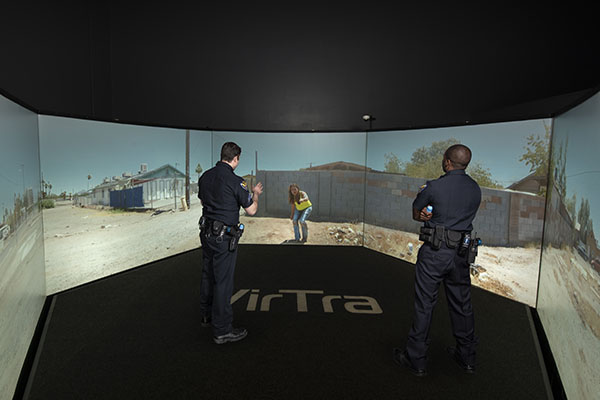VirTra Simulator
The Center for Behavior Analysis and the UWF Police Department have invested in a VirTra 300 LE training experience simulator. This simulator utilizes technology enabling behavior analysts and law enforcement officers to collaborate and supplement existing training with the science of behavior.

Participants step into a 300-degree, immersive system, enabling them to train for the most difficult real-world situations with realistic variables such as multiple and intense visual and auditory stimuli, the use of standard issued weapons and active return fire simulation.
This unique opportunity permits for heightened physiological responses while providing a safe environment to practice fluency and maintenance of situational awareness while addressing scenarios that require tactical de-escalation and use of force.
Ongoing training is critical for every law enforcement agency to help keep officers sharp in the field and up to date on the latest laws and policies. The system offers hundreds of fully interactive scenarios that can convey body language and other non-verbal threat cues to teach, train and test officers. Each VirTra scenario helps officers improve their critical thinking skills and weapons skills under pressure and psychological stresses of life-like situations. Scenarios average between 25 and 85 different branching paths to a resolution allowing for hundreds of possible outcomes determined by the officer’s behavior.
Interested in Experiencing a VirTra Simulation?
How Simulation Can Boost Your Agency's Training Efforts
Customized Officer Training Enhancement
The goal of this partnership between the UWF Police Department and the Center for Behavior Analysis is to work with all sizes of law enforcement agencies, from local to federal, each with its own training objectives and mandates to provide access to the VirTra simulator for enhanced training opportunities. The ability to develop specific scenarios and courses tailored to local needs and goals is a key benefit of the VirTra simulator.
Community Outreach
In addition to officers and law enforcement agencies, the Center for Behavior Analysis also welcomes community leaders and groups to foster a better understanding of what it’s like to stand in the shoes of an officer and make split-second decisions under pressure.
Education School Leaders
Community outreach is a key potential use for the simulator, and this includes helping educators understand how law enforcement approaches campus safety. School resource officers can bring school principals and other educators to experience active shooter scenarios for a better understanding of the officer’s perspective and what must be done to make the campus more secure.




